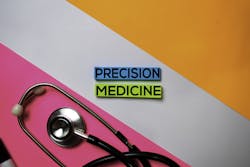Precision medicine is a buzzword that has circulated the healthcare industry for many years. The concept of precision medicine, physicians taking a patient’s variability in genes, environment, and lifestyle into account, sounds like science fiction. Healthcare is generally a one-size-fits-all approach where the treatment of disease and prevention strategies are developed for “the average person” with little consideration for the differences between patients. But the concept of genomics has been gaining momentum for quite some time.
The National Institutes of Health's All of Us Research Program began in 2018, and as we reported on March 17, has made nearly 100,000 whole genome sequences available to researchers. Approximately 50 percent of the data is from individuals who identify with racial or ethnic groups that have historically been underrepresented in research. The genomic data is available via a cloud-based platform, the All of Us Researcher Workbench and includes genotyping arrays from 165,000 participants.
Yet, Public Perspectives on Personalized Medicine, a survey of 1,001 Americans commissioned by PMC and GenomeWeb, found that most Americans are not familiar with personalized medicine.
The survey states “According to the survey, which was conducted by KRC Research, 67 percent of Americans have never even heard the terms “personalized medicine” or “precision medicine,” which are often used interchangeably to describe the process of targeting medical interventions to only those patients who will benefit. Only 13 percent of respondents indicated that they feel “very informed” about the topic. When personalized medicine was defined for them, 67 percent indicated a “mostly positive” reaction to it. Majorities of respondents indicated that the field could provide “major” benefits to the health system, and 82 percent said they want to learn more about it.”
One hospital system began its journey the same year that the All of Us Research Program began. Maulik Purohit, M.D., associate chief medical information officer at University Hospitals in Cleveland says that “University Hospitals is tries to be a very progressive organization and tries to find the best methods to deliver better patient care. We are always looking for ways to improve. In 2018, which seems like so many centuries ago, we were looking how to deliver better personalized care for the individual patient and precision medicine offered that potential. The struggle was the infrastructure because even if you have knowledge about genetic code, how do you get that genetic information through a test? How do you have access for the patient? How do you get them to a lab and have that data come into the electronic health record (EHR) in a way that's analyzable?”
Purohit added that the decision was made, due to all of these questions, to partner with the Pittsburgh, Pa.-based organization, 2bPrecise. 2bPrecise offers a platform that consumes genetic/genomic data from molecular labs and clinical information from EHRs and synthesizes the data into a clinical-genomic ontology. The company helped with products and also implementation.
As to what aspects of precision medicine University Hospitals is offering, Purohit says that “Our core and lead in this area is an area called pharmacogenomics. And pharmacogenomics is the ability to understand the interaction of a medication with an individual at the individual level. We have research studies that look at drugs and medications and what they offer for patients and side effects, but they're done on a population level. But the question for provider always is, if I have a patient in front of me, how's that individual going to react to the medication? Personalized medicine with pharmacogenomics offers some help with that. Additionally, we're looking at expanding our offerings to our psychiatry area for depression. We also have some offerings right now in oncology and in pediatrics. As we learn more about precision medicine, both in the scientific area as well as the infrastructure side, we hope to expand more.”
When it comes to patients, Purohit comments that “I think consumer knowledge is going to drive consumer demand for better care and better technology. We've already seen that in the evolution of how we deliver healthcare, like telehealth, for example. I think this is an area that creating a better and more knowledgeable consumer is going to create better demand and better ways to do things for the patient.”


